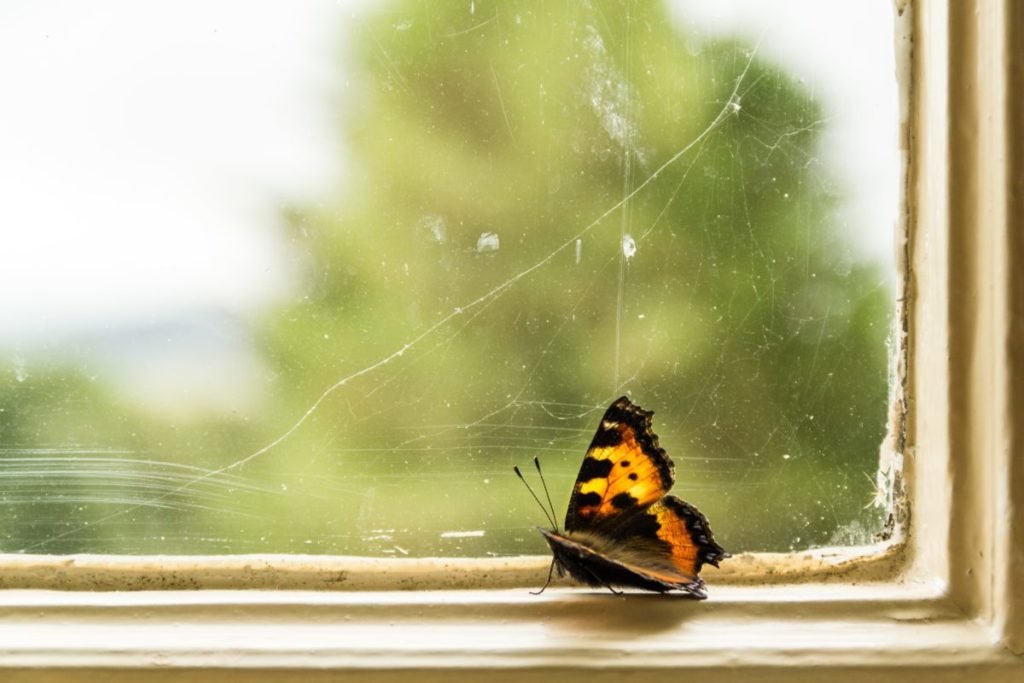
Delia López plans to win her school’s “Make a Buzz!” contest. She figures she’s leading so far, at least in the fourth grade.
On a warm Sunday afternoon in early February, she walks to Elk Neck State Park with the boxful of bees she made over the weekend. She’s going to activate the bees in the park and get a ranger to sign off on how many she has, so she can add that total to her contest scoresheet. Her teachers have explained how important the contest is. Without it, they said, there wouldn’t be any bees in Maryland at all, but what Delia really cares about is the prize. It’s a real rosebush that her mother can plant in the front yard. Those are super-rare and expensive, and Mom has talked forever about how much she misses roses.
The park ranger, who looks as young as Delia’s brother Tony, watches Delia position her bees on the leaves of a blooming laurel. The sun makes her sweat so her T-shirt sticks to her back. The light, sweet smell of the laurel flowers hangs in the air. Most of the trees in the park are the synthetic kind, with CelluLast branches, solar-panel leaves, and oxygen-venting ducts, but the bees need real flowers.
Delia’s master switch activates her crop all at once. Some of them take off and circle the bush, while others crawl toward the nearest blooms. When Delia first started making them, she had trouble getting them to balance right when they flew. They’d plunge straight to the ground after takeoff. This group, though, is perfect, just like the real bees Delia and her classmates have seen in videos at school.
“Nice job, kid,” the ranger says. “So that’s two dozen.” He fills the number in on her tally sheet and signs it. After he heads back to the park entrance, Delia stays where she is, sitting cross-legged by the laurel to watch her bees work. She’s made more than two hundred by now, but she never gets tired of them.
Someone says, “What are those?”
Delia turns around. The woman standing behind her has hair and skin as brown as Delia’s own. She’s wearing army fatigues, which Delia recognizes right away because her brother Tony is going to get his once he graduates high school in June.
But Delia doesn’t understand the woman’s question. “Those what?” she says.
The woman sits down a little distance away, drawing her knees up against her chest. “Those things on the bush,” she says. “They look like honeybees, but I thought there weren’t any left around here.”
Delia wonders where this woman has been. “That’s why we make them,” she says, trying not to let herself sound like what Mom calls “Muchachita Lo Sabe Todo,” Little Miss Knows Everything. She doesn’t explain how there are no real honeybees left between Maine and Florida, but she does say, “You can’t grow crops or anything without them.”
“I know that,” the woman says. She’s quiet for a minute, watching one bee dive into a laurel bloom and climb back out of it again, covered in yellow pollen. “So how do you make them?”
She really doesn’t know much. “You start with tiny drones,” Delia says. “You know drones?”
The woman looks at her. She’s younger than Delia’s mom, but close up, her face looks very tired, as if she’s an old person hiding under young skin. “Yes,” she says. “But the drones I know are much bigger.”
Delia remembers Tony talking about how the army sometimes uses drones to carry bombs. Being a boy, he thinks that’s pretty cool. “Well, our drones are tiny,” she says. “And you put microcomputers on them. You program them so they know how to look for flowers and get pollen.” She doesn’t let herself add, Everybody knows that.
The woman nods. She doesn’t look impressed or surprised or anything, just tired. Delia watches her watching the bees. The woman’s shoulder-length hair, tied back in a ponytail, is pretty tangled. Her fatigues are dusty and her skin looks sort of shiny, as if she hasn’t had a shower in a while. Delia thinks she must be sweaty in her long pants and shirt.
“Have you ever seen a monarch?” the woman asks.
Delia tries not to laugh. “We don’t have kings in America.”
“Not that kind.” The woman smiles for the first time. “The butterfly.”
Delia’s never heard of such a thing. “No. What are they like?”
The woman thinks for a second, as if she has to pull words together. Then she says, “They were orange and black, striped like a tiger. In the sun they kind of glowed.” She looks past Delia, like she’s talking to someone invisible. “We used to get them in my backyard when I was a kid. There weren’t many, even then.”
Delia tries to imagine an orange-and-black butterfly. “What happened to them?”
She figures she already knows. A lot of things died out when the world got too warm, but it would be polite to let this woman tell her something for a change.
The woman’s eyes come back to Delia’s face. “I think they died because they had no home to go to.”
Delia didn’t expect that. The woman says, “They used to spend the winters in Mexico, in the mountains, but I think one winter they got there, and all the trees were gone.” Something in her voice makes Delia swallow hard. “The way I imagine it, they just gave up. Folded their wings and fell out of the air.”
Delia can picture that. A whole cloud of butterflies falling out of the sky in a rain of glowing, orange-and-black wings. She wishes the woman hadn’t mentioned it.
The woman says, “Do you live around here?”
For a second, Delia wonders whether she should answer, but the sadness in the woman’s eyes reaches out for her. “Yes,” she says. “I live on Turkey Point Road. Where do you live?”
“Nowhere.” The woman smiles again, like she wants to make it a joke. “I grew up in Pennsylvania, and then I was in Iran for two years with the army. Now I’m here. I’m not sure where home is.”
That sounds scary to Delia. Lonely, too. She hears herself say, “I’m Delia López. What’s your name?”
“You know, I’m not sure about that either.”
Delia decides she probably has amnesia. Delia might tell her to see a doctor, and then she might go home and tell her brother Tony that maybe being in the army isn’t all that great. It messes with your head.
Then the woman laughs, a sudden bright sound. “I shouldn’t say that. My name is Lila Foster. At least, that’s what everybody calls me.”
Delia is confused. “Isn’t it your name?”
“I guess so. I used to be Gloria Rodriguez, but that was a long time ago.”
Rodriguez. That could be a Mexican name, like Delia’s own. Delia wants to ask the woman why she changed her name, but it’s getting late, and she has to get home for supper before Mom starts worrying. She scrambles to her feet, collecting her now-empty box. “Well, nice to meet you, Ms. Foster.”
The woman doesn’t stand up. “Nice to meet you too, Miss López.” She stays there, watching the bees, as Delia walks away.
**
On Monday, Delia learns that she’s leading the fourth grade in the “Make a Buzz!” contest. The same day, she asks her science teacher, Jack Carlson, about monarch butterflies.
Mr. Carlson has white hair and thick glasses. When Delia says the word “monarchs,” a shadow of sadness passes over his face. “Yes,” he says. “I remember them.”

He pulls a thick book out of the small, dusty collection on the shelf behind her desk. Delia sees the title on the spine: Butterflies of the Eastern United States. Mr. Carlson flips through and stops on a full-page spread.
“That’s what they looked like.”
Delia stares at the picture. The only butterflies she knows are the little white ones that hang around her yard in the spring. The monarchs are huge, bright as paint. Delia can see that it’s true: they were kings.
On Sunday, she goes back to Elk Point with a new bee crop. The ranger has signed off on this batch—thirty—and Delia is watching them again when Lila Foster comes back.
“More bees, Miss López?”
Delia likes being called miss. “Yes.” Politely, she asks, “How are you, Ms. Foster?”
The woman sits down. “You can call me Lila. I’m all right, I guess. Pretty warm this week.”
She’s still in the fatigues. Delia wonders if she knows how hot it’ll get in Maryland in May. She asks, “Are you living around here now?”
“Camping,” Lila says. “I did a lot of that in Iran. It’s hotter there, but not so humid.”
Delia thinks about asking her what it’s like in another country. Instead, she remembers something from last week.
“Why aren’t you Gloria Rodriguez anymore?”
Now she’s being what Mom calls fisgón. Nosy. For a second Lila looks surprised. Delia wonders if she’ll get angry, but then Lila says, “My parents named me Gloria. They were from Mexico. They came here almost twenty years ago.”
That’s way before Delia was born. Lila continues, keeping her eyes on the laurel.
“We crossed the Rio Grande down in Texas. I was about two years old.” Her voice is flat but steady, the words marching out like soldiers. “The thing was, we weren’t supposed to be here. We were illegals.” Delia knows what that means. Lila says, “So there were soldiers, police, and they caught us. They sent my parents back to Mexico. They kept me here.”
Delia doesn’t understand. “Kept you?”
Now Lila looks at her. The pain in her face grips Delia by the throat.
“They separated a lot of kids and parents back then. I guess they lost track of who belonged to who.” She smiles, but it looks like somebody else is pushing her mouth up at the corners. “Anyway, my mom and dad were gone, so I got put up for adoption. That’s how I became Lila.”
Delia pictures some faceless person taking her from Mom and Dad. Her stomach clenches like a fist. “But maybe you could find them again,” she says. “Your parents. If you went back to Mexico.”
Lila shakes her head. “I don’t remember their names. Sometimes I’ve thought, maybe I could go to Mexico City and just look around, or something, but there’s really nothing left for me there.”
Delia remembers the story about the monarchs getting to their winter home and finding the trees gone. How they gave up, folded their beautiful wings and let themselves fall to the ground. Tears prickle under her eyelids.
She doesn’t let them out, but Lila seems to notice something. “That’s too sad of a story for a pretty day,” the woman says. She stands up and dusts her hands on her pant legs. “Don’t worry about me, Miss López. Will you come back again next week?”
Delia nods. Lila says, “Will you bring more bees? I like them.”
“I will.”
But as she watches the woman head toward the campground, Delia knows she won’t have more bees next week. She has to make something different.
**
All week, Delia’s schoolmates go on with the contest, but Delia has Mr. Carlson’s permission to work on something else. It’s much harder.
Bees hover, but butterflies flutter and flap. So you can still start with a drone, but you need to attach the wings the right way, and program the drone to glide and dart so the wings move like in real life. The wing fabric also has to be light but strong, so that it won’t tear or wrinkle, and it has to let light shine through it.
Delia thinks about the way the white butterflies in her yard move. She spends hours at home perfecting her project, coloring the black pattern on her orange Teflon-and-silk-blend wings, so it looks just like the picture in Mr. Carlson’s book. She also uses a microcomputer programmed to look for flowers, because the book says that monarchs used to be great pollinators too.
All week, Delia knows her classmates are probably getting ahead of her in the contest. She might not be able to win that rosebush after all, but she’ll find some way to make it up to Mom later. All she can think about is a tired, worn-down woman hurting for what she lost.
On Sunday afternoon, Delia’s project is done. She nestles it, along with its activation switch, in a little box. Her heart jumps in her chest as she walks to the park.
Lila is already sitting by the laurel that Delia thinks of as hers. The woman looks around and smiles as Delia comes up.
“It’s the Bee Lady!”
Delia grins, but she hopes Lila won’t be disappointed. “Actually,” she says, “I don’t have bees today.”
“Really?” Lila is curious. “Then what’s in the box?”
Delia decides to make it as much of a surprise as she can. “Close your eyes.”
Mom would say she shouldn’t order a grownup around, especially not a stranger, but Lila doesn’t seem like a stranger to Delia. More like somebody she knew from a long time ago.
The woman shrugs and obeys. Delia’s hands tremble as she opens the box.
She positions her project on a laurel branch and sits down next to Lila, cupping the activation switch in her palm. “Okay,” she says. “You can look.”
At the same time that Lila opens her eyes, Delia hits the switch.
She knows what it’ll look like, but in this second, Delia feels like she’s seeing it for the first time herself. The butterfly lifts off from the branch. Its wings catch a shaft of sunlight and glow like stained glass. It rises on a breeze and flaps its wings to glide toward an open bloom.
It’s perfect.
Lila’s mouth opens, but she doesn’t say a word. As her eyes follow the butterfly from one bloom to another, she looks so stunned that Delia wants to giggle. Then she blinks and Delia sees the glitter of a tear caught in her eyelashes.
Delia hits the switch again. The butterfly glides down to another branch and closes its wings. Delia reaches out and picks it up as gently as if it were alive.
She tucks it back in the box with the switch and holds the box out to Lila. “It’s for you.”
Lila doesn’t say thank you. She doesn’t say anything as she takes the gift in her hands, but Delia doesn’t need her to.
In this second, she looks even younger than Delia herself. She looks like a little kid opening the best birthday present ever. She looks, Delia thinks, like someone who found something she thought was gone for good.

Share this post with your friends.

